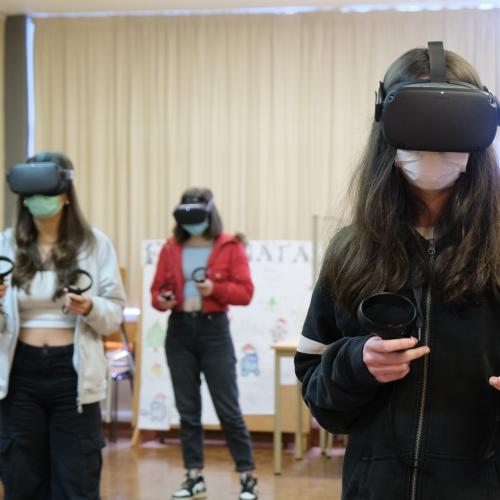
Interactive VR games: Fostering a self-protection culture among teenagers
In the 'Keeping Safe!' campaign of Madeira's Civil Protection Service, students find themselves immersed in virtual scenarios facing a variety of risk factors.
Throughout its long history, the Madeira Archipelago has suffered from natural disaster such as floods and forest fires, which led to a considerable loss in human life and destruction of infrastructure. Its isolated position, mountainous nature, high urban pressure and vulnerability to extreme weather events are all challenges faced by Madeira’s Civil Protection Service.
To help develop a prevention and self-protection culture, the Civil Protection Service has been working on building a closer relationship with the school community. Several school projects, mainly targeting young students from 6 to 11 years old, have been carried out. Communication systems based on new technologies are now being employed to particularly appeal to the 12-18 age group.
In ‘Keeping Safe!’, campaign participants are using VR glasses to find themselves immersed in a virtual 3D world that recreates several scenarios with diverse risk factors. Players will be able to explore these virtual worlds, with the actions that they perform leading to different outcomes. Players will encounter scenarios like:
✓ Emergency kit where the player must choose which items should be included in an Emergency Kit.
✓ Fire in the forest. A fire in the forest is about to reach the player's home. The player will need to perform actions like freeing hens, closing the windows, and watering the house walls to better protect their family's home.
✓ Fire at home. The player is confronted with a burning pan in their kitchen, so they must do several actions to protect their home and contain the fire, such as using a fire extinguisher, a fire blanket or calling 112.
✓ Fire inside a tunnel. In this scenario the player, who is traveling in a car with their mother, is faced with a car burning in the tunnel that they are passing through. They have to perform several actions to protect themselves, their family and the other drivers.
✓ Flash flood. Having a flash flood as scenario, the player will face several situations that must be solved to ensure their and their younger sister's protection.
Students between the ages of 12 and 18 had the opportunity to try these scenarios in the safe environment of their schools. In total, 11,880 adolescents were reached through 718 actions at schools on two islands of the Madeira Archipelago, Madeira and Porto Santo. The project even exceeded its initial targets over the 18-month project cycle.
A set of 2D interactive videos based on the same five scenarios was also created, to be used by teachers in other ongoing safety projects.
The VR games and the 2D interactive videos were developed by a Portuguese start-up and financed by Community funds through the PO SEUR Program. After the end of the 18 months school demonstrations, these products could also be made available to the various Regional and National Civil Protection entities, as well as the remaining schools of Mainland Portugal and the Azores Archipelago.
Through the use of cutting-edge technology, “Keeping Safe!” is an innovative project, that addresses themes that are too often neglected by teaching programs. This communication, using newly emerging VR systems, will grab the attention of the younger population to these themes, promoting a more resilient region, by increasing the culture of civil protection on its population.
The Madeira Archipelago is composed of four groups of islands, Madeira, Porto
Santo, Desertas and Selvagens. Madeira Island is situated approximately 600 km northwest of the Western African coast and 900 km from mainland Portugal. Madeira has an area of 737 km2 and a maximum altitude of 1861 km at the top of Pico Ruivo. It is a volcanic island originating about 6 million years ago from the activity of an oceanic hot spot in the African Plate, with a population of approximately 267,785.
Sectors